
English Department
Why study English?
Language surrounds and defines us. Culture, history and even your own personality are shaped and shared through language. At the broadest level, the study of English literature and language involves close inquiry into everything from human psychology to cultural history. Reading Chaucer, Shakespeare, Mary Shelley, Jack Kerouac, and Toni Morrison, the English major at Regis effectively pursues the evolving character of humanity. How do language, society and the self alter as they are reconceived in feudal, scientific or multi-cultural contexts? Ask a student of English.
In narrower terms, the study of English consists of reading, analysis and writing. Reading is, in the first place, an exercise of the imagination. Poems, plays, stories, novels and essays are but words on a page: it is the act of reading that creates the feelings, characters, settings, actions and ideas the words seem to express. At Regis, English majors learn how to perform the act of reading consciously and critically, not only imagining the world the words signify but also understanding how and why the words produce such imaginative meanings and how those meanings differ from writer to writer, age to age. In other words, our students learn to read analytically, to see the whole text in terms of its parts and to interpret one text in terms of many others.
Along with reading and analysis, the study of English at Regis involves intensive training in writing. As literary texts insistently show, successful writing begins as a process of self-discovery and ends as a product of communication. Our majors practice various kinds of writing– expository, argumentative, creative – but, in one sense, always with the same purpose: to articulate their own ideas and express them with persuasive force.
Because it produces broadly educated students who can think critically and write persuasively, the English major or minor at Regis is an excellent preparation for careers in law and politics, marketing and public relations, education, publishing and journalism, technical and freelance writing and the arts and culture industries. It is also, we hope, an end in itself, an imaginative and intellectual experience that will enlarge, enrich and otherwise redefine your very self.


Additional Areas of Study
- English Minor
- Writing Minor
- English Film Studies Minor
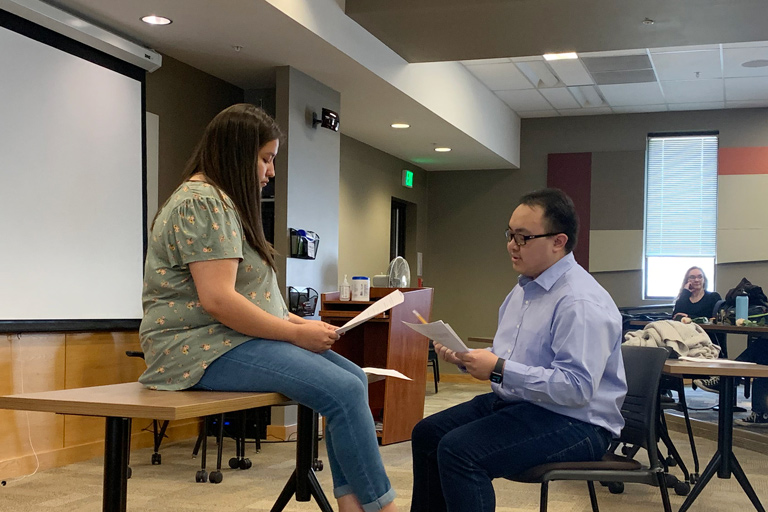
BA/MFA Dual-Study Degree
The BA/MFA dual-study degree allows undergrads to earn a semester’s worth of credit towards their Master of Fine Arts in Creative Writing degree while completing undergraduate credits, so students can earn a master’s degree in one year.

Beyond the Classroom
Your education in English goes far beyond lectures and textbooks. Here, you’ll dive into transformative experiences that bring your learning to life. Whether you’re researching groundbreaking literary topics, crafting your own novel, or staging a short play, you’ll have countless opportunities to explore your passions. Our students learn from renowned visiting writers and scholars and present their work at prestigious conferences like the Association of Writers and Writing Programs (AWP) and the National Undergraduate Literature Conference (NULC). Study abroad programs can take you across the globe—from the literary landscapes of Scotland to the vibrant streets of Korea, Italy, and Thailand. And field trips to local sites allow you to walk the same Denver streets once frequented by the Beat Poets. In our department, learning is an adventure.
Community and Connection
Here in English, we believe in the power of community and collaboration. From a weekly tea time with faculty and students to our annual Halloween Party and holiday dance, we create opportunities for students to connect with peers and professors in a fun, relaxed atmosphere. Our English Club brings students together for social events, building friendships that last beyond graduation. For those moments when you need quiet reflection or intimate class discussions, we have a dedicated creative writing room—a perfect space to focus, create, and inspire. In English, you’ll find more than just academic growth—you’ll also find a close-knit community that supports and challenges you.
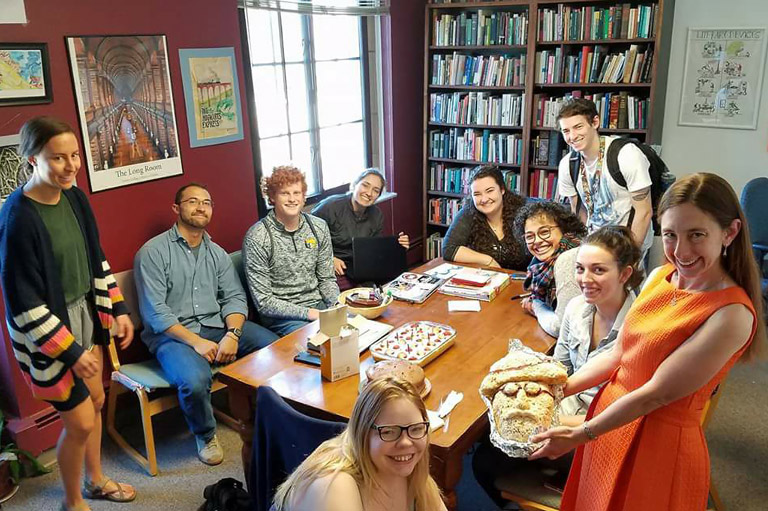
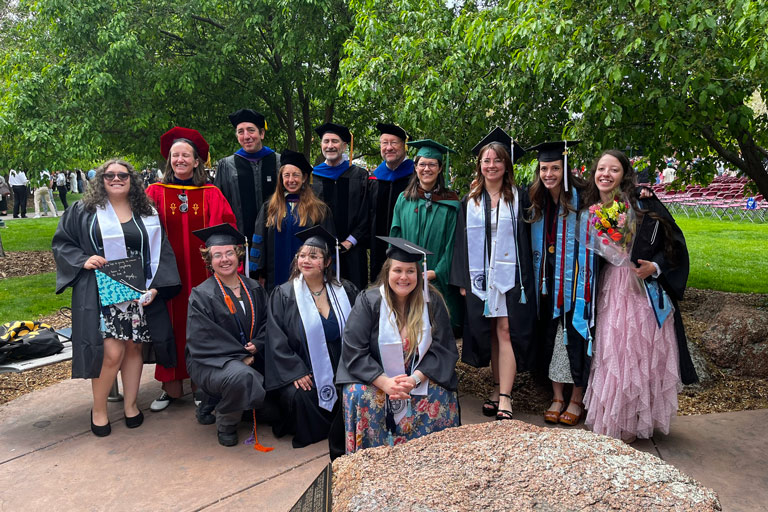
Where English Takes You
A degree in English opens doors to a wide variety of fulfilling careers, and our alumni prove just how far those doors can take you. English graduates are in demand across numerous fields, including business, law, publishing, marketing, education, writing/editing, nonprofit work, and entertainment. National data show that English majors are well-employed and well-compensated, and surveys reveal that 96% of English majors would major in English again. Recent Regis alumni have pursued careers with companies like Rolls Royce, Marvel Entertainment, Deloitte Consulting, and Hachette Book Group. Our graduates also go on to graduate study at top institutions like Carnegie Mellon, the University of Chicago, and King's College London. Offering skills in communication, problem-solving, empathy, and critical thinking, an English degree is a path to success.
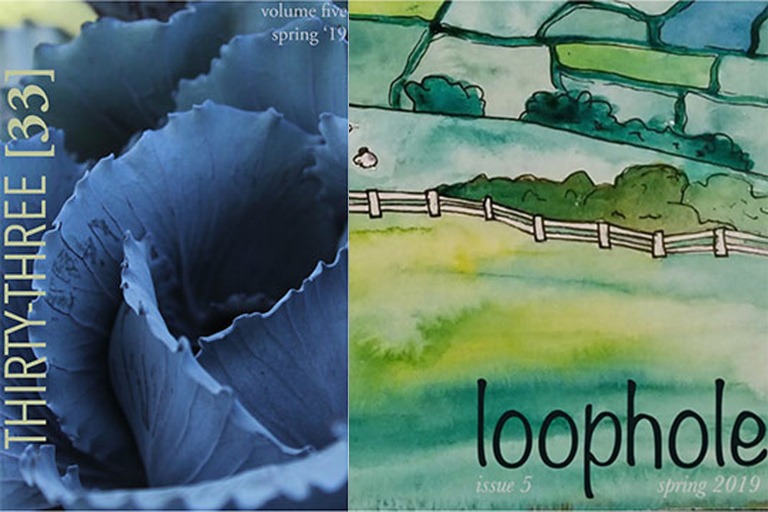
Student Publications
The English Department is home to Regis's student-edited academic journal, 3333, and literary arts journal, Loophole. Debuting every spring, these journals publish student writing from across Regis University, and provide valuable professional experience for students interested in editing and publishing careers.
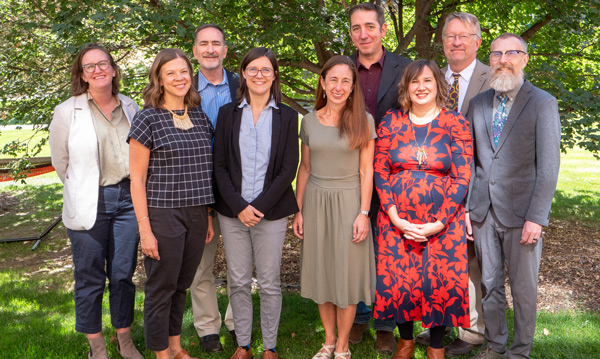
English Department faculty members publish widely in creative writing and criticism:
Dr. Eric Baus's book of poetry, How I Became a Hum, "situates [itself] on porous borders between sound and image, echo and repetition," according to critic John Yau.
Dr. J'Lyn Chapman's book, To Limn/Lying In, takes its inspiration from the artist Uta Barth's photographs of the sun as it enters her home and the poet Francis Ponge's notebooks kept during the German occupation of France. This collection of lyric essays contemplates light as seen through the domestic space and its occupants, predominantly the author's young children.
Dr. Scott Dimovitz’s book, Angela Carter: Surrealist, Psychologist, Moral Pornographer, draws on thousands of pages of Carter’s journals, letters, and other works from the British Library’s archives to unlock the secrets of her bizarre and wondrous worlds.
Dr. Lara Narcisi's book, Radical Empathy in Multicultural Women’s Fiction: From the Library to Liberation, analyzes and embodies how fiction provides the possibility for radical empathy by connecting us with strangers. By putting women novelists of color in conversation with another, and foregrounding the growing importance of intersectionality studies, this book considers how race, gender, and class interact for each author.
Prof. Alyse Knorr's book of poetry, Wolf Tours, imagines an eco-tourism company run by a pack of sentient wolves, offering life-changing adventures for humans seeking a deeper connection with nature. The book explores themes of climate change, eco-grief, queer love, and cross-cultural communication.
Dr. Daryl Palmer’s book, Becoming Willa Cather: Creation and Career, is a groundbreaking literary biography that offers a provocative new look at Willa Cather’s evolution as a writer, paying unprecedented attention to Cather’s early short stories.
Dr. Kate Partridge's book of poetry, THINE, explores shifting iterations of the poetic self, both in body and in perspective, within the context of rapidly changing landscapes in the American West. The book’s observational approach draws together ecopoetics with art and myth, turning a skeptical eye toward predictions of both apocalypse and hope.
Dr. Andrea Rexilius's book of poetry Sister Urn is, in the words of author J. Michael Martinez, "a requiem both intimate and broad in scale, memorializing the life of a sister cut short and the unraveling aftereffects of the anthropocene."




